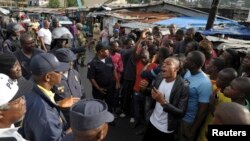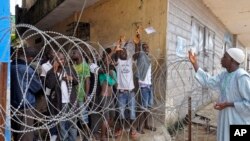Some residents of Liberia’s West Point say Ebola-related restrictions are becoming unbearable. And they say if the situation continues for another week, the already angry residents could become even angrier.
The World Health Organization (WHO) says nearly 2,500 people have been infected by the Ebola virus in four West African countries, with more than 1,350 people dead.
The WHO says 90 percent of new Ebola deaths have occurred in Liberia.
President Ellen Johnson Sirleaf Wednesday announced the quarantine of West Point, a densely populated borough of the capital, to control the spread of the virus.
Resident Jatu Harris, a fish marketer, said the restrictions are affecting the community’s way of life as marketers are unable to sell products.
“We are not selling in peace and we are not even getting back the money we spent to purchase our goods. We cannot go outside; nobody is coming in; we’re just here... If you want to go out of the community to visit your family, the security will say if you leave you will not be allowed to come back,” Harris said.
She said the government on Thursday delivered rice for the first time since the quarantine began, but it was not enough for the community.
In addition, she said the rice was “rotten”, and that only the strong were able to get their ration.
“They said they brought 300 bags of rice for us today. But we have six zones in West Point and the food cannot serve everybody. And if you are not strong, you will not be able to get in line to get your ration. So most didn’t get [any], and the rice was very rotten,” Harris said.
Archie Ponpon is a member of Respect Incorporated, a local NGO headquartered in West Point. He told VOA the quarantine violates the residents’ constitutional right of freedom of movement.
“The Ebola situation is disturbing. The rights of people are being violated in terms of their movement. The army is entering into people’s homes forcing them to go indoors before the start of the curfew. There is nowhere for people to sell,” he said.
Ponpon also said there is a shortage of drugs and medical services since everyone in the community has been quarantined.
Liberia’s Defense Minister Brownie Samukai told VOA this week the government has no intention to increase the hardship of the people. He said the quarantine and curfew are intended to minimize human-to-human contact, thereby breaking the chain of transmission of the Ebola virus.
“The key issue is that there is a deadly outbreak of the Ebola virus in a very congested community. We have to find the way to cut the spread of the virus. And, the way to cut the spread of the virus is to make sure that we identify those who have the sickness and, at the same [time], identify those who need assistance,” Samukai said.
Harris said the government did not prepare the community in advance for the possible impact of the quarantine and other Ebola-related measures.
“They never did it the right way because by 1:00 Tuesday they closed down the community without telling us anything,” she said.
Meanwhile, a tense calm was reported Thursday in West Point, a day after riot police clashed with residents who tried to break the quarantine placed on the area.
The residents was sparked by the government’s decision to remove their commissioner from the area. After all, they said, she as a resident of West Point was also affected by the quarantine.





